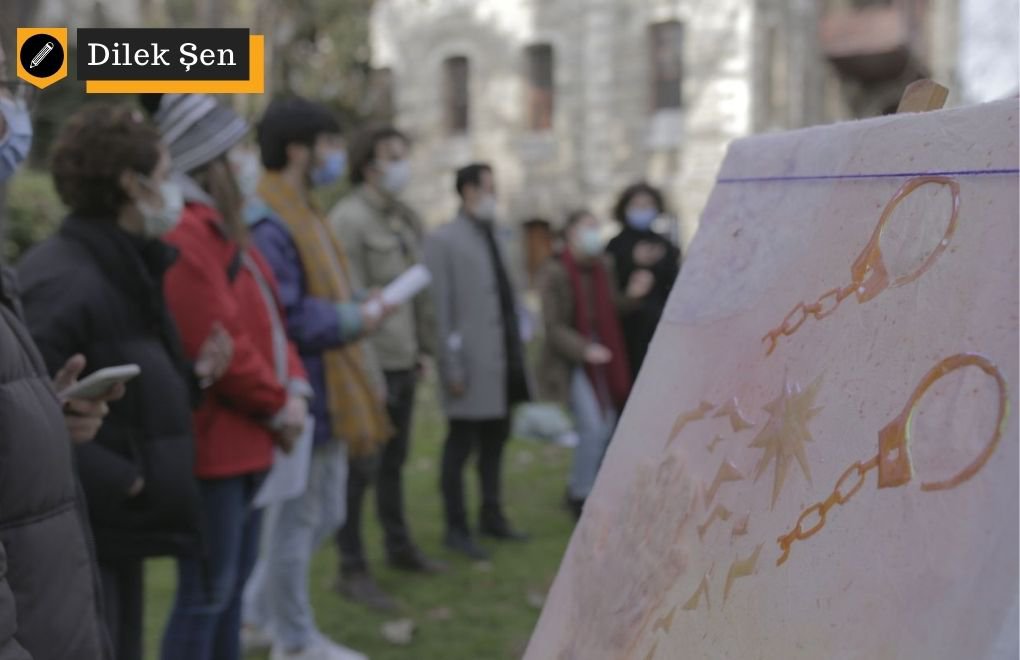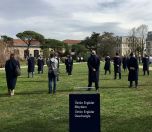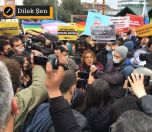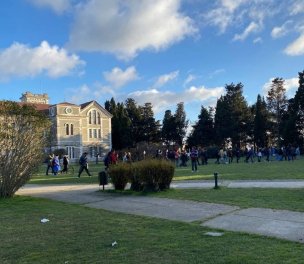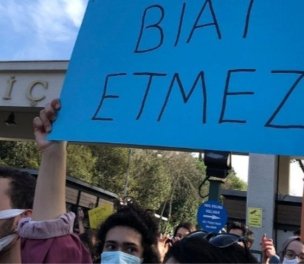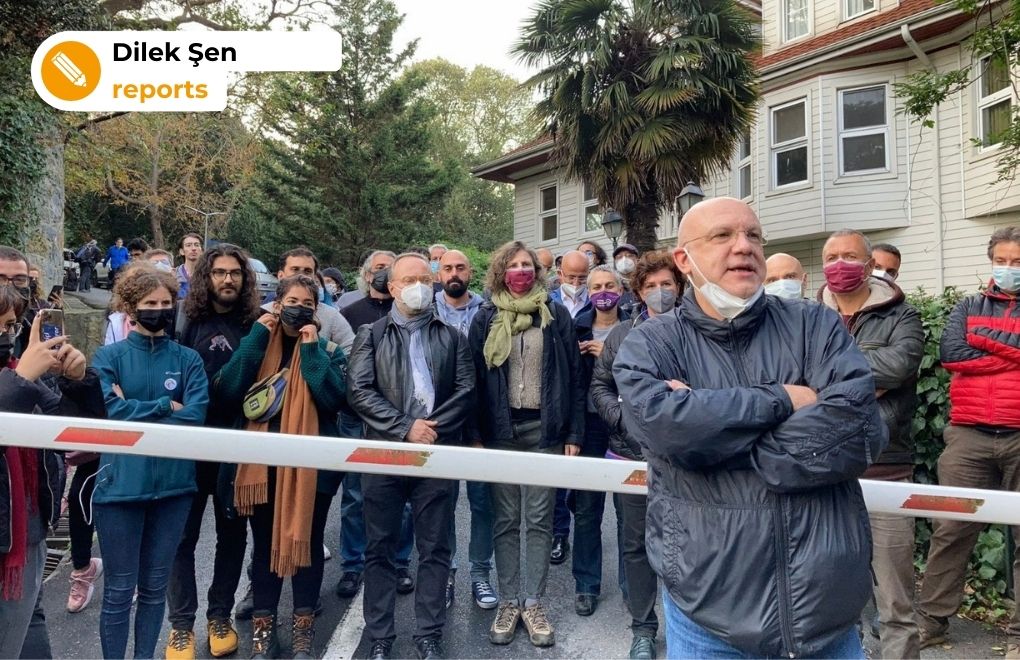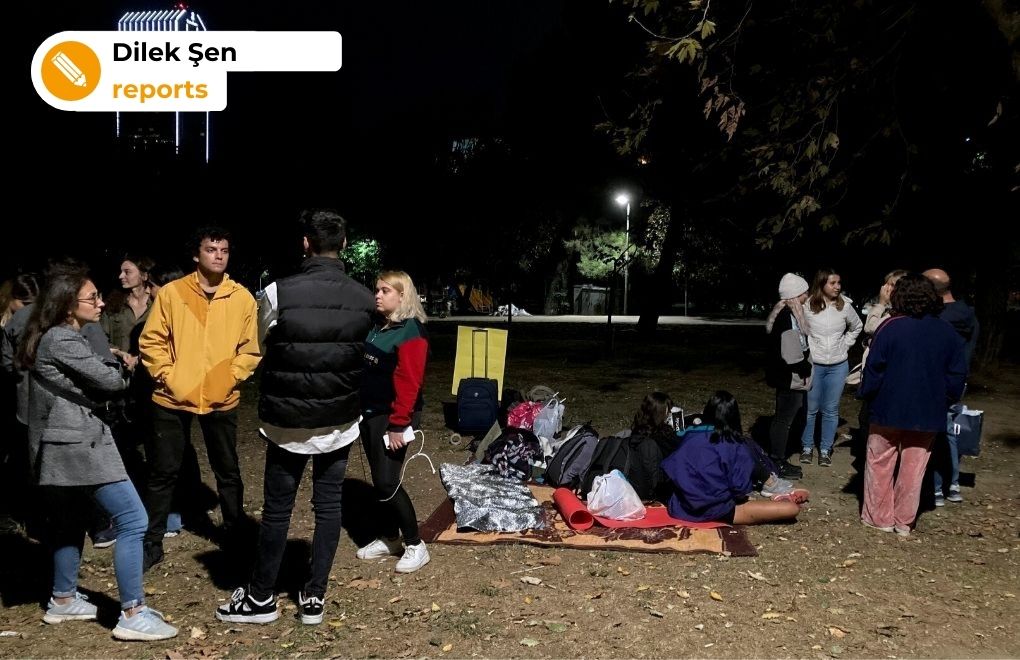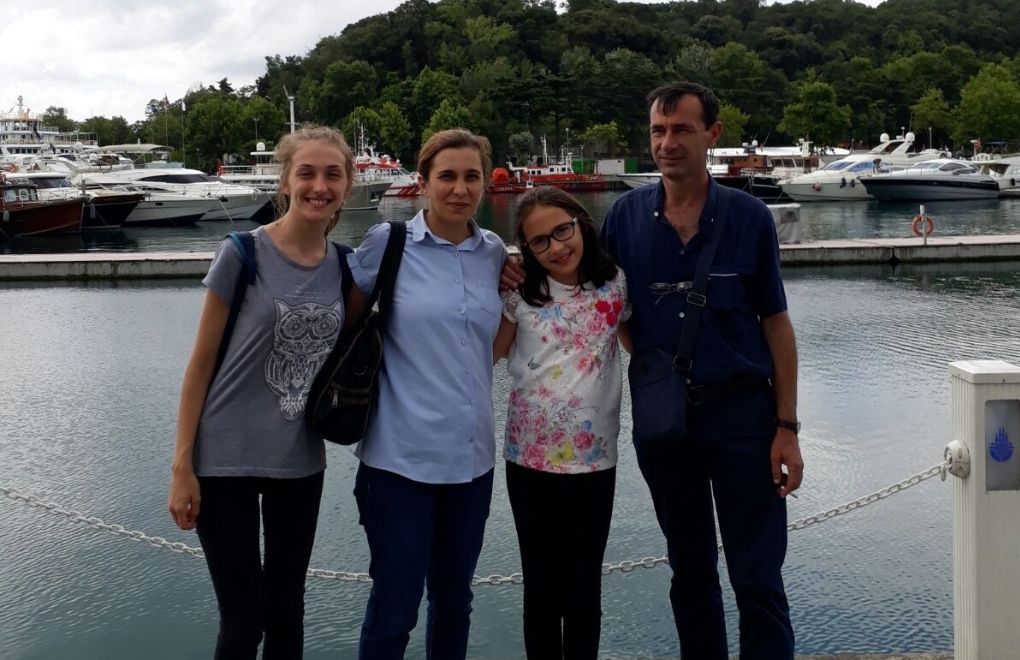* Photo: Boğaziçi Solidarity
Click to read the article in Turkish
After Prof. Melih Bulu was appointed as a rector to Boğaziçi University on January 2, students have been protesting this appointment at their campuses in İstanbul and on social media since January 4.
As of 10 a.m. today (February 11), 11 university students were arrested and at least 25 people were under house arrest over Boğaziçi protests. At least 557 students have also been detained over the past month.
But on what charges have the students been arrested or placed under house arrest? The answer is "provoking the public to hatred and hostility" and "resisting the police to prevent them from fulfilling their duty".
Lawyers Hüseyin Ersöz, Özgür Urfa and Bahar Topsakal have explained to bianet what these charges mean.
All three lawyers have underlined that in a legal system where even the judgements of the Constitutional Court and the European Court of Human Rights (ECtHR) are not enforced, citizens no longer trust justice, emphasizing that the arrest of students is political.
Defining the imprisonment of students as "contrary to law and unjust, from the top to the bottom," lawyer Topsakal has said, "The judiciary of the Republic of Turkey must rise above its own judiciary of Court of Cassation, Council of State and Court of Accounts, including the Constitutional Court, and try to keep up with the jurisprudence of the ECtHR."
'Result of an attitude extended to the general'
Hüseyin Ersöz:
"The charge of 'provoking the public to hatred and hostility' has been used quite frequently especially after Gezi incidents. It has especially become the indispensable article of political trials in the recent period.
"An action that cannot be included in any article in the Turkish Penal Code (TCK) can be included in this article and a detention or arrest warrant can be issued against people by relying on this article.
"The ECtHR have very serious criticisms about this type of crime and about the charge of 'insulting the President.' In other words, it is not compatible with the universal law, either.
"In order for this crime of 'provoking the public to hatred and hostility' to be constituted, the public must be seriously affected by this and the negative consequences of this action must resonate among the public.
"This is, in fact, not a type of crime that can be constituted by allegedly creating a WhatsApp group or by what is done in this WhatsApp group, as was also the case in the arrest of B.B.
"To me, such rulings are quite problematic in terms of people's trust in the law. This is the result of an attitude extended to the general, such as the refusal to enforce Constitutional Court and ECtHR judgements.
Twitter, WhatsApp... And 'This is you!'
Özgür Urfa:
"Charges have been brought against various students. They have been arrested because they wanted to attend a press statement or they posted messages on social media. Arrest cannot be the case in these instances because they do not involve any force or violence.
"The Code of Criminal Procedure (CMK) says that 'in order to arrest a person, there must be catalogue crimes in question and there must also be flight risk or risk of spoliation of evidence.' First, these crimes are not catalogue crimes. Second, these are all university students, their places of residence are known and they have no flight risk.
"About B.B... Twitter does not share user data. In other words, there is officially no such source of data. The police write the username of one person and click 'I forgot my password' to hack the account, so to speak. It is what they did there. They followed where the rescue password was sent. As Twitter does not give any information about it, either, the only thing written in the file is that the password was sent to a phone number ending with 12.
"They said, 'B.B.'s number ends with 12 as well, so this person is B.B.' The only finding underpinning her detention is this. There are over a million phone numbers ending with 12 in Turkey. They picked B.B. among them, said, 'It is you', raided her house, seized her phone and computer, took her statement and sent her to prison within two hours.
"Unlawfulness has become the law in Turkey. After they were targeted by politicians and accused of being 'terrorists', these people were detained and arrested, they are now in prison. In other words, they have been arrested with a political decision after a political process.
"The release of these students from prison will not be the result of a legal process, either. The more the public pressure is, the more people express their demands for justice, the more they claim these students, the faster these people will be freed. So, this political process will be finalized with a political process. The judiciary is just made an instrument for this."
'It is contrary to law, it is unjust'
Bahar Topsakal:
"Under normal circumstances, it is impossible to talk about arresting people on these charges. A person of law with the minimum level of education must not raise a request for arrest and the Public Prosecutor must not send the file to the Penal Judgeship of Peace. Therefore, it is something contrary to law and unjust, from the top to the bottom.
"There is this universal criminal law principle of 'in dubio pro reo', meaning that a defendant may not be convicted by the court when doubts about his or her guilt remain. In considering the arrest of B.B., the Public Prosecutor's Office should have referred to this principle.
"In other words, it should have directly concluded that there were no grounds for investigation. As we have seen in this case, it looks like we can all be suspects some day. A good person of law could have referred to the ECtHR judgements and enforced this principle.
"Citizens do not trust the law in Turkey. I, as a person of law, do not trust the law much either when politics is involved.
"But it must, of course, not be hopelessness. Because if we, as lawyers, fall apart, we will have no chance of crying when the Turkish law falls apart altogether one day. Measures must be taken before this happens.
"The judiciary of the Republic of Turkey must rise above its own judiciary of Court of Cassation, Council of State and Court of Accounts, including the Constitutional Court, and try to keep up with the jurisprudence of the ECtHR. Because we might see that the Court of Cassation, Council of State and Court of Accounts give partial rulings.
"It was just a few days ago when we all saw how the Chief Public Prosecutor İrfan Fidan was made a member of the Constitutional Court and how meritocracy was not involved there." (DŞ/SD)





